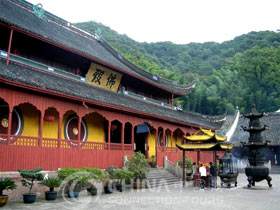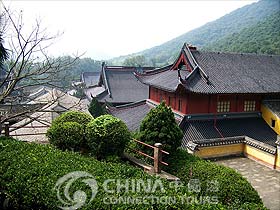 Tiantong Chan Temple located at the foot of the Taibai Mountain (also called Tiantong Mountain) in Dong Township of Yin County, 25km southeast from the urban area of Ningbo. It gets its name from the tale that monk Yixing built a house here in Year 300 (the first year of Emperor Yongkang in Jin Dynasty), while the God of Taibai Golden Star dispatched a child to supply him with the food from heaven. Surrounded by green hills and with old trees reaching to the sky, Tiantong Chan Temple sets itself in luxuriant forests and high bamboos. The temple was built in 300 AD in the West Jin Dynasty. With its history of 1700 years, the temple is 90 years older than the Lingyin Temple in Hangzhou. As one of the ten sacred temples of the Buddhist Chan sect, Tiantong Chan Temple is also known as "Buddha's Holy Land in Southeast China".
Tiantong Chan Temple located at the foot of the Taibai Mountain (also called Tiantong Mountain) in Dong Township of Yin County, 25km southeast from the urban area of Ningbo. It gets its name from the tale that monk Yixing built a house here in Year 300 (the first year of Emperor Yongkang in Jin Dynasty), while the God of Taibai Golden Star dispatched a child to supply him with the food from heaven. Surrounded by green hills and with old trees reaching to the sky, Tiantong Chan Temple sets itself in luxuriant forests and high bamboos. The temple was built in 300 AD in the West Jin Dynasty. With its history of 1700 years, the temple is 90 years older than the Lingyin Temple in Hangzhou. As one of the ten sacred temples of the Buddhist Chan sect, Tiantong Chan Temple is also known as "Buddha's Holy Land in Southeast China".
The temple has more than 20 ancient buildings including Tianwang Dian (Hall of Heavenly King), Fatang (House of Buddhist Texts), Xianjue Tang (House of Foresight), Luohan Tang (Arahat House), Tower House, Yushu Lou (House of Imperial Inscriptions). The temple originally had 999 rooms, 730 of which are left, now occupying 58,000 square meters. Its grandeur is rare in China. In the temple there are the Imperial Inscriptions and Steles by Emperor Shunzhi, Emperor Kangxi and Emperor Yongzheng in Qing Dynasty.
Tiantong Chan Temple listed in the second place among the five Chinese Zen Buddhist School Mountains. Surrounded by mountains, the large temple covers an area of 5.8 hectares, composed of hundreds of halls, towers, pavilions, houses and so on.
 Tiantong Chan Temple not only serves as a leading site of Buddhist teachings for Linji Sect (whose root can be tracked to Jinshan, Hangzhou). It is also the fountainhead of the Japanese Caodong Sect. During the South Song Dynasty, the Japanese monk Daoyuan, left his home, Jianren Temple in Kyoto for China. After he traveled the renowned places in Zhejiang, he came to Ningbo in the hope of greater enlightenment and became a disciple of Venerable Master Rujing at Tiantong Temple studying the teachings of Caodong Sect. At last he returned to Japan, where he found Yongping Temple and started the Japanese sect of Caodong Buddhism. At present this denomination owns 15 thousand monasteries in Japan and 8 million adherents. In honor of Tiantong Chan Temple as the father of the Japanese Caodong Sect, in 1980, the abbot of Yongping Temple led a team of monks to Tiantong Chan Temple and dedicated the temple a tablet inscribed with words to the effect of "Tablet in memory of Japan's Zen Master Daoyuan for his attainment of enlightenment in Tiantong Chan Temple".
Tiantong Chan Temple not only serves as a leading site of Buddhist teachings for Linji Sect (whose root can be tracked to Jinshan, Hangzhou). It is also the fountainhead of the Japanese Caodong Sect. During the South Song Dynasty, the Japanese monk Daoyuan, left his home, Jianren Temple in Kyoto for China. After he traveled the renowned places in Zhejiang, he came to Ningbo in the hope of greater enlightenment and became a disciple of Venerable Master Rujing at Tiantong Temple studying the teachings of Caodong Sect. At last he returned to Japan, where he found Yongping Temple and started the Japanese sect of Caodong Buddhism. At present this denomination owns 15 thousand monasteries in Japan and 8 million adherents. In honor of Tiantong Chan Temple as the father of the Japanese Caodong Sect, in 1980, the abbot of Yongping Temple led a team of monks to Tiantong Chan Temple and dedicated the temple a tablet inscribed with words to the effect of "Tablet in memory of Japan's Zen Master Daoyuan for his attainment of enlightenment in Tiantong Chan Temple".

